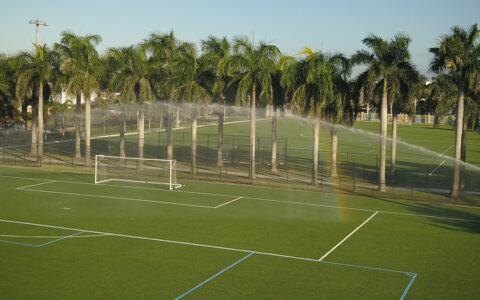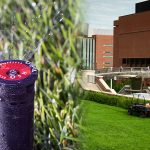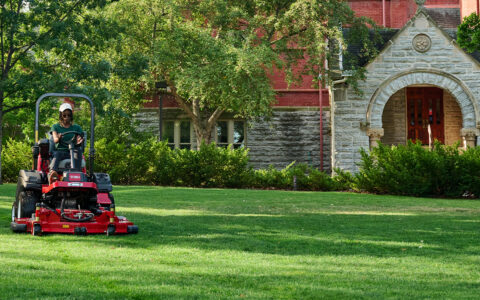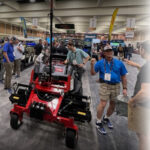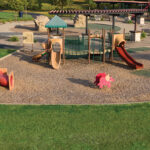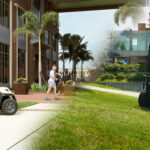Solving for the Challenge: How Toro® Irrigation Meets Different Needs
No two sports fields are alike, especially when it comes to irrigation. But with the right combination of products and design support, you can have a system that not only helps you water efficiently but also helps you save time and labor.
The following examples show how different projects with unique needs are using Toro® products to solve their irrigation challenges.
Toronto
Blue Jays™ Professional Development Complex
Every year, the Toronto Blue Jays conduct spring training at their
Professional Development Complex (PDC) in Dunedin, Florida. The 65-acre
training complex has six full fields and two half fields, and will feature a
new 115,000-square-foot facility that is currently under construction.
The facility is in the process of a major renovation that began in November 2017 when the city entered into an agreement with the Blue Jays to keep spring training and minor league operations in Dunedin for the next 25 years. Part of that agreement was a provision to expand and update the PDC.
Well before that agreement, however, Patrick Skunda was doing his research. “It was a dated facility in terms of spring training sites, so we knew construction was coming,” explains Skunda, who is turf superintendent for the Blue Jays’ Florida operations. “We’ve really been planning for this for years. But in 2016, things started heating up and we began looking into what we wanted and needed from the field side.”
According to Skunda, the facility had previously experienced a lot of issues with irrigation water, so irrigation was a big concern for him. “We use 100 percent effluent reclaimed water piped in from a municipal source,” he says. “The city of Dunedin is a smaller municipality, so we can be running irrigation water at night and run out of water — especially in drought scenarios. A high priority for me was not only looking at sources for water, but also looking at the watering system itself.”
Skunda’s search for a more environmentally friendly solution took a turn because of a chance meeting at a trade show with one of Toro’s irrigation representatives. “We started talking about the Sentinel® Central Control system, soil moisture meters and weather stations … and really letting the software itself control what we do on a daily basis based on our ET [evapotranspiration] rates,” Skunda remembers. “That was something that sparked an interest with me.”
One of the things that struck Skunda was the fact that Toro’s soil moisture meters have the capability to monitor salinity levels. “We battle a tremendous amount of salts,” he says. “It’s one of our biggest challenges here in terms of managing turfgrass. With those moisture meters, we can monitor soil temperatures, salts and moisture levels to a four-inch depth, so that definitely got my interest.”
After Skunda started researching Toro’s central control system option and seeing what it had to offer, he knew that was the technology he needed moving into the next level — especially with the amount of grass he would be taking on and managing with the updated facility. “The system sold itself,” he says.
Once the decision was made, Skunda worked closely with Toro throughout the two-year design and construction process. “I realized right from the start that I liked the support I was getting from Toro. They were constantly checking in with me, answering questions and going over products. Once we started getting into field designs, Toro took a strong hand in making sure that no stone went unturned. I was very impressed by that, and the support I received over this whole process has been nothing but outstanding.”

Two of the full fields and one of the half fields at the PDC have been completed with Toro irrigation products, including a central control system with soil moisture sensors, as well as T7 Series and T5 RapidSet® Series rotors. Moving into April 2021, the facility will be renovating two more fields with Toro irrigation products.
The stadium where the Blue Jays play their spring training games also just completed construction on a new playing surface with a complete Toro central control system, weather stations and soil moisture meters.
Skunda says he thinks the new Toro irrigation system will help with permitting in the future. “When we go back to governmental bodies and tell them why we’re using the amount of water we’re using, it’s pretty easy for us to pull up the software and show them what our ET rates are,” he notes. “Now when they tell us we’re using too much water, we have more analytics to back it up. It shows we’re holding to a more professional standard. We made an investment in the fields we just constructed, so we definitely want to protect those assets — and this is a piece that’s protecting the water management of this property.”

Mary
Institute and Saint Louis Country Day School
The Mary Institute and Saint Louis Country Day School (MICDS) in St. Louis,
Missouri, installed its first Toro Sentinel system back in 2004. The 121-acre
campus has 11 Sentinel Central Control satellites, as well as Toro’s 640 Series
and T5 RapidSet rotors, 252 Series valves and 570Z Series sprinklers.
Mark Sweeney, director of grounds at MICDS, says the school originally looked at a competitor’s system, but decided on Sentinel. “We have never once been dissatisfied,” he notes.

“The first reason I chose Toro is because all of our mowers and a lot of our implements are from Toro,” Sweeney says. “We’ve got about seven pieces of Toro equipment, and I’ve been really happy with them. When I compared the Toro system to the [competitor’s] and looked at the different features, I was sold — especially with the luck I’ve had with Toro.”
The campus is now in the middle of upgrading their central control to a newer system. Sweeney is working closely with Toro to make the transition, and five of the 11 satellites have already been updated.
“It’s a bit of a learning curve, because everything works differently, but everything has run smoothly with the upgrade,” Sweeney says. “We do one system at a time and make sure everything works instead of doing the whole thing at once.”
Technicians from Toro’s National Support Network (NSN®) and other Toro irrigation representatives have assisted Sweeney with the switch to the new software. “The people I’ve dealt with have been really easy to work with,” he says. “There’s not one question I’ve ever asked that they don’t know the answer to. So it’s kind of hard to go away from Toro when everything has been working so well.”
One of Sweeney’s favorite features of the central control system is two-way wireless communication options, including radio control. “I couldn’t tell you the last time I even went to a clock now that I have radio,” he says. “You can do it all by hand-held. I do a lot of it on my phone. It just works phenomenally.”
For Sweeney, the flexibility to choose different communication options is key. “There are about five different ways you can go,” he says. “If the Internet goes down, you can always go to the clock or the radio. Nothing’s really down at any point, which is what I like.”
With more than 1,200 students from Junior Kindergarten through 12th grade — as well as 330 employees and 11 athletic fields — running irrigation around different schedules can be a challenge. “With the ease of Toro’s controller, it’s really worked out well,” Sweeney says.
How Toro
Solves for the Challenge
For sports fields and grounds, specifying an irrigation system requires a
high degree of planning and communication. As these examples show, strong
relationships help make the project go smoothly — and building strong customer
relationships has always been core to our values at Toro.
In addition, Toro offers the full spectrum of irrigation products to fit virtually any installation, as well as the expertise to assist with design. For more information about Toro’s comprehensive line of irrigation solutions for sports fields and grounds, contact your local Toro distributor or visit toro.com/irrigation.




